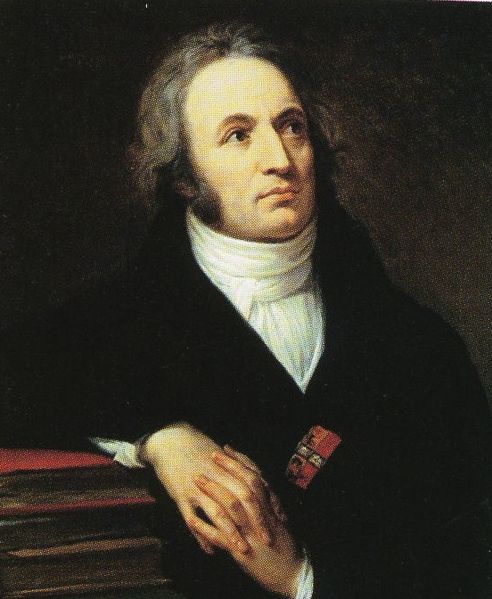<Back to Index>
- Explorer and Geographer Sven Anders Hedin, 1865
- Poet Vincenzo Monti, 1754
- Member of the Swiss Federal Council Wilhelm Matthias Naeff, 1802
PAGE SPONSOR

Vincenzo Monti (February 19, 1754 – October 13, 1828) was an Italian poet and scholar.
Monti was born at Alfonsine, Ravenna, the son of Fedele and Domenica Maria Mazzari, landowners. He was educated at the seminar in Faenza and at the University of Ferrara, where he studied medicine and jurisprudence.
In 1775 he was admitted to membership of the Arcadia Academy and the next year his first book was published: "La visione di Ezechiello" ("Ezechiello's vision").
In 1778 Monti moved to Rome, there invited by cardinal, and papal legate in Ferrara, Scipione Borghese. He married Teresa Pikler who bore him a daughter, Costanza, and a son, Francesco (the latter died only two years old).
In 1797 he left Rome and, after visiting Bologna and Venice, finally settled in Milan, forsaking his former opposition to the French Revolution (expressed in the "Bassvilliana") and becoming a supporter of the newborn Cisalpine Republic. In 1799, he was forced to leave the town when the French were defeated, but it took him only two years to come back, following the Battle of Marengo (1800).
While in Paris, Monti devoted more and more of his time to translations from French and Latin, which today are considered to be his best works: he published "La Pucelle d'Orleans" by Voltaire, soon to be followed by the "Satire" by Persio and the "Iliade" (Iliad) by Homer.
After
the fall of Napoleon in
1815, Monti tried to win back the Austrian regime with
his last poems
"Il mistico omaggio" and "Il ritorno di Astrea",
before committing to
the development of Italian linguistics during his last
years.
Many authors have given different opinions about the poet's value. Two factors are generally agreed upon, but they are given different weight yielding a more or less favorable judgement: the lack of ideals and authenticity, and the superior technical skills.
In the fast changing political scenery of his time, Monti appears not to live up to his ideals: he is blamed from the political point of view for being first an opponent to the French revolution, then an open supporter of Napoleon, then eventually a supporter of the Austrian Empire. Furthermore he is accused of expressing insincere feelings in his works and of only caring about the formal aspects of his productions.
In a time of strong political ideals such as the "Risorgimento" and strong interior passions such as Romanticism, famous representatives of Italian literature such as Ugo Foscolo and Giacomo Leopardi pointed out to these as unforgivable flaws, whereas in their opinion a poet should never give up his beliefs in exchange for practical advantages, and should prefer a worthy content over a much refined literary technique.